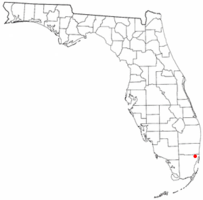Demographics
Historical population| Census | Pop. | Note | %± |
|---|
| 1980 | 5,721 | | — |
|---|
| 1990 | 6,568 | | 14.8% |
|---|
| 2000 | 6,224 | | −5.2% |
|---|
|
As of the census [1] of 2000, there were 6,224 people, 1,502 households, and 1,264 families residing in the CDP. The population density was 1,107.4 people/km2 (2,868 people/sq mi). There were 1,588 housing units at an average density of 282.5 units/km2 (732 units/sq mi). The racial makeup of the CDP was 20.07% White (5.5% were Non-Hispanic White,) [7] 74.98% African American, 0.16% Native American, 0.47% Asian, 0.03% Pacific Islander, 1.83% from other races, and 2.46% from two or more races. Hispanic or Latino of any race were 19.10% of the population.
There were 1,502 households, out of which 41.5% had children under the age of 18 living with them, 44.2% were married couples living together, 31.9% had a female householder with no husband present, and 15.8% were non-families. 11.5% of all households were made up of individuals, and 2.7% had someone living alone who was 65 years of age or older. The average household size was 3.58 and the average family size was 3.79.
In the CDP, the population was spread out, with 28.0% under the age of 18, 21.5% from 18 to 24, 25.4% from 25 to 44, 18.5% from 45 to 64, and 6.6% who were 65 years of age or older. The median age was 25 years. For every 100 females, there were 90.3 males. For every 100 females age 18 and over, there were 83.9 males.
The median income for a household in the CDP was $35,618, and the median income for a family was $32,283. Males had a median income of $25,777 versus $21,112 for females. The per capita income for the CDP was $10,780. About 17.2% of families and 19.9% of the population were below the poverty line, including 23.5% of those under age 18 and 19.1% of those age 65 or over.
As of 2000, before being annexed to Miami Gardens, English as a first language accounted for 75.24% of all residents, while Spanish was spoken by 21.04%, French Creole was at 3.27%, and Jamaican Creole as a mother tongue made up 0.44% of the population. [8]
This page is based on this
Wikipedia article Text is available under the
CC BY-SA 4.0 license; additional terms may apply.
Images, videos and audio are available under their respective licenses.

